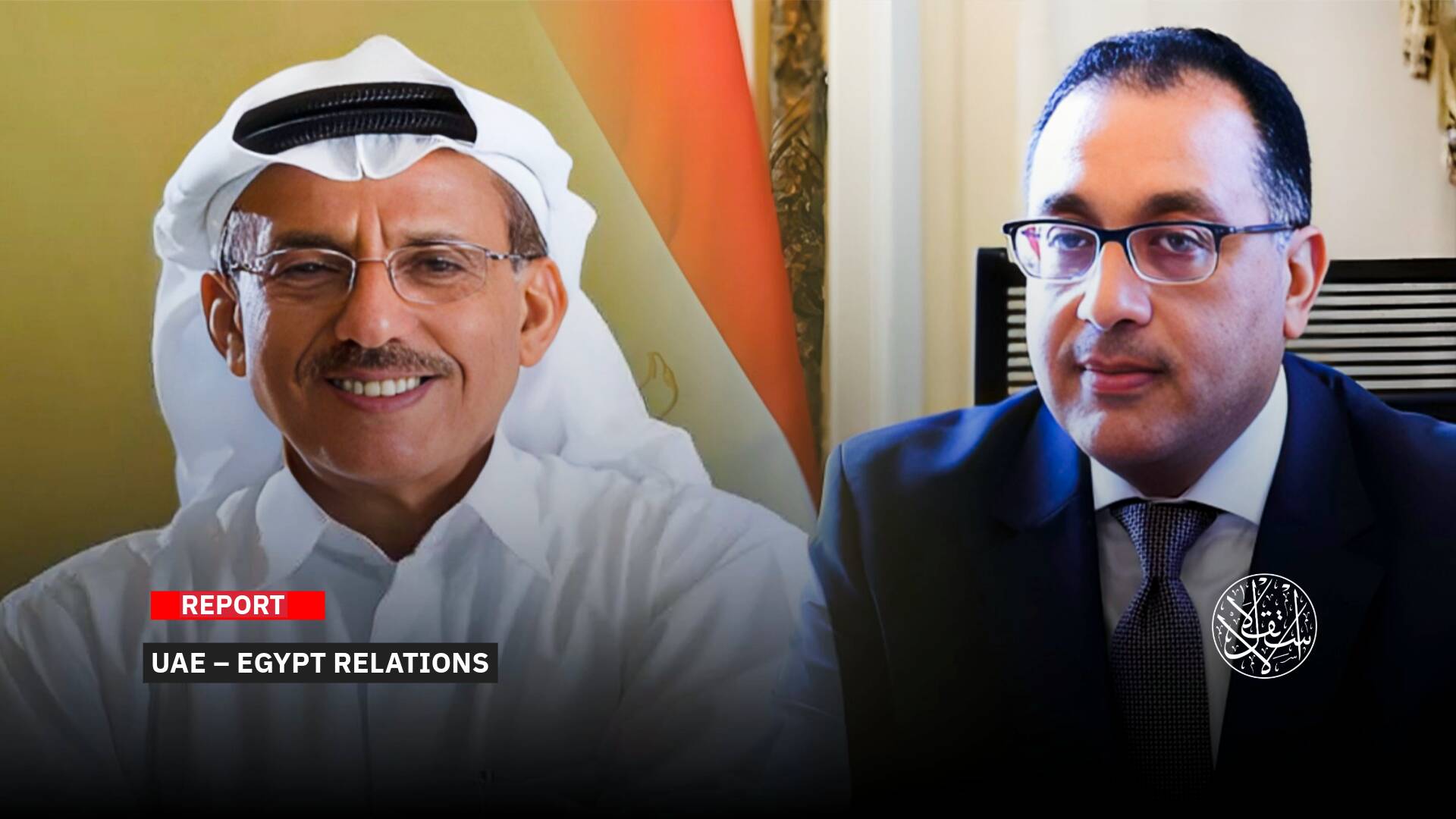Sudanese Brigade for Al-Estiklal: These are our Options to Tackle the Crisis of the Renaissance Dam
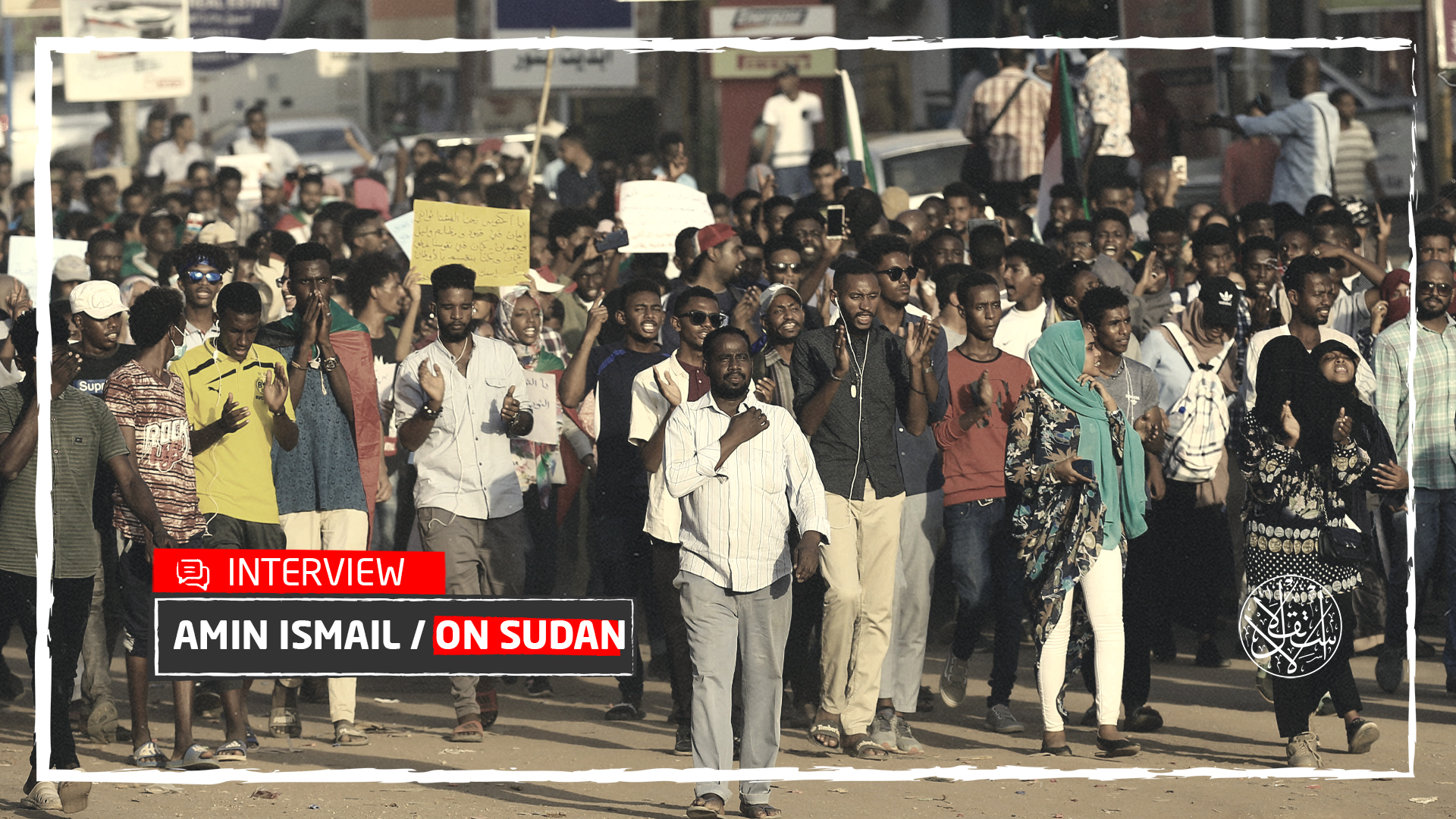
Sudanese Major General Engineer Dr. Amin Ismail Majzoub confirmed that the "barricades revolution" against corruption in Sudan has produced a mixed sovereignty council between military and civilians, and in 2018 the youth demonstrations presented a new experience for the world that blended the armed forces with civilian forces in power.
Majzoub in an interview with al-Estiklal affirmed that the Sudanes people reject normalization with the Zionist entity, seeing that: "This occupation is the first enemy of the nation that has abandoned the Palestinians, captured their homes and desecrated the sanctities of the nation.”
Moreover, Sudan was a state of reluctance and provided considerable support to the Palestinian cause and its various factions and would not accept the normalization that had been postponed for presentation to the legislative council to be formed, he said.
Ethiopia had succeeded in ending negotiations on the GERD file, besieging Cairo and Khartoum with four options, the most bitter of which was either surrendering to the fait accompli or violent military action rejected regionally and internationally, as well as its exorbitant requirements.
Sudan had recovered its looted land from Addis Ababa and called on it to have an economic partnership and accept the demarcation of the border between them in accordance with the 1903 Convention, stressing that Ethiopia was a locked state and could not go to war with us today because it depended on Khartoum ports, and there were more than 4 million Ethiopian workers in Sudan who transferred $200 million a month.
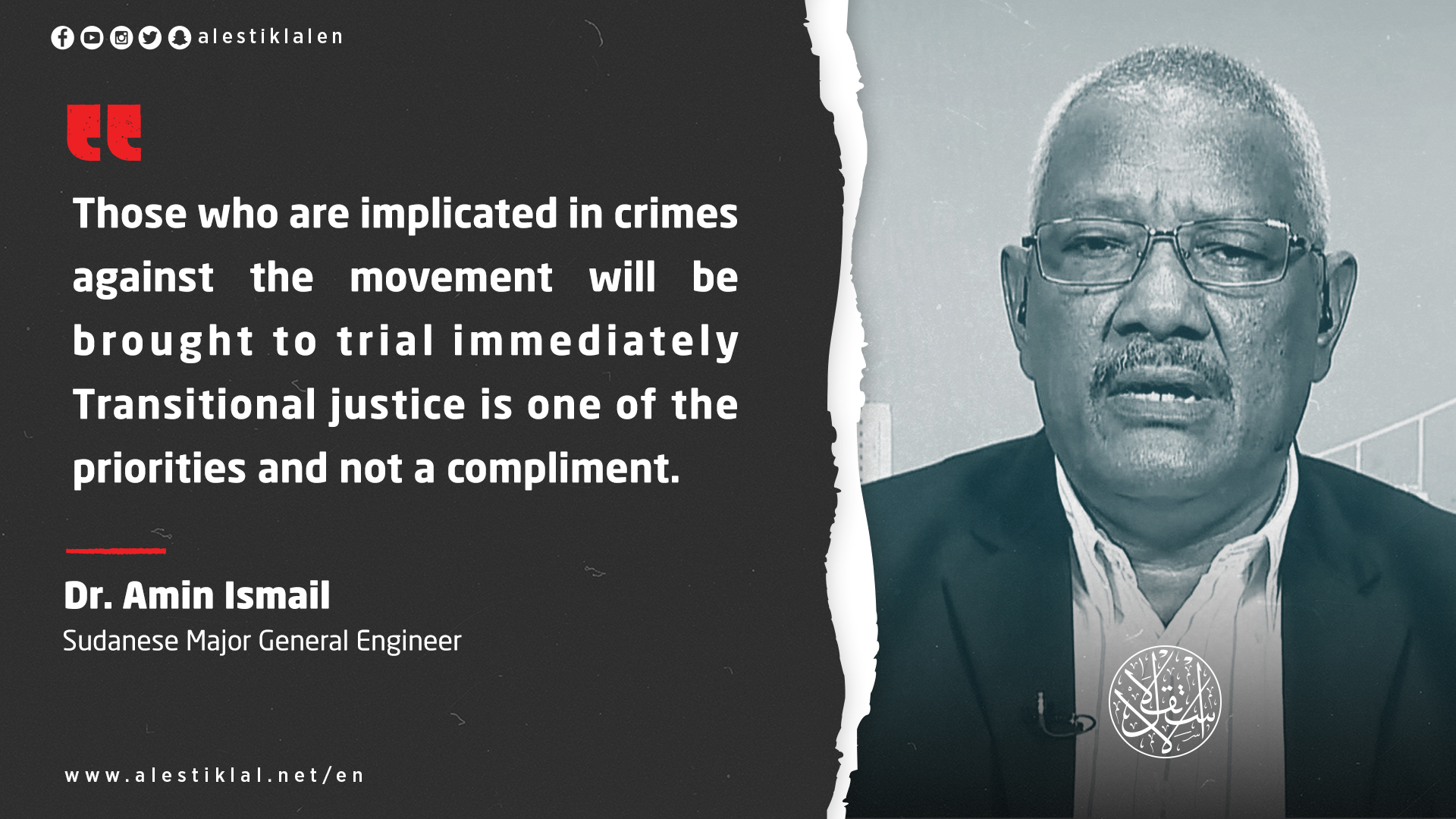
Movement and Rights
- How do you see the political movement taking place in Sudan and where it has reached?
Dr. Amin Ismail: The political movement in Sudan began in 2013 to protest the practices of the Bashir regime, but it stopped and then renewed at the end of 2018; then there was the "barricade revolution" carried out by Sudanese youth, protesting against the corruption of the former regime, and the security committee, which includes the armed forces, police, security and intelligence services, sided with the rebels.
The movement produced a mixed sovereignty council of military and civilian components, an entire civilian cabinet and two Governments were formed.
The transition period is steadily reaching its goals in accordance with priorities set by Prime Minister Abdullah Hamdok to achieve peace, which was already achieved through the Juba Peace Agreement in October 2020, despite the existence of two groups outside the negotiations and outside the agreement.
The economy has also been promoted by removing Sudan from state sponsors of terrorism, integrating into the international community and reaching debt forgiveness.
The movement thus produced a new reality and presented a new experience for the world: the combination of the armed forces and civilian forces in power during the three-year transition period.
- Where did the rights of martyrs and revolutionaries go in Sudan?
Dr. Amin Ismail: In my estimation, the rights of martyrs who fell under the former regime and during the dispersal of the sit-in after the revolution have now been formed to identify those responsible, and another committee for the missing.
Those found to be involved in these crimes will be brought to trial immediately, and transitional justice is one of the priorities.
Other material and moral rights after criminal sentences are also available and their rights are hopefully preserved and moral support provided to families, especially since there have been numerous crimes committed by the former regime over 30 years.
Some of the abuses that took place during the revolution have also turned into cases now pending before the courts and the required data are provided.
The model of political participation presented by the Sudan between the civilian and military components is a new experience that has produced a mixed sovereignty council and a transitional Government.
The military component's almost 21-month rule ended last year (2020), but the transition period has been extended for one year and months later it will end and the presidency of the Sovereignty Council will be handed over to the civilian component.
Normalization and Mercenaries
- Where did the issue of normalization in Sudan go? What is the position of the Sudanese people on relations with the Zionist entity?
Dr. Amin Ismail: The normalization file with Israel took a lot of controversy inside Sudan considering that the step was taken by the president of the Council of Sovereignty (Abdel Fattah al-Burhan), and the fact that the whole thing was returned in the file of normalization to the legislative council, which will be formed in the coming days to decide on this file that affects the future of the country.
The Sudan was also a reluctant State that provided significant support to the Palestinian cause and to various factions under the former regime.
But after the revolution, convictions turned to entering normalization to satisfy America, which put it as a condition for removing Sudan from the state sponsors of terrorism, and there is also a regional alliance moving toward normalization with Israel, and there are 3 Arab countries printed with it, the last of which opened an embassy in Tel Aviv a few days ago (he means the UAE).
Therefore, in my estimation, this file will take a very long time in Sudan after it has been discussed in the Legislative Council.
Even if it’s sanctioned, it will remain trapped only among the elites, because there are large sections of the Sudanese people who reject normalization, and they have grown up in an atmosphere that has been firmly established in their minds that Israel is the first enemy of the Arab and Islamic nation and the traditional enemy that occupied Palestine, abandoned its people and killed and displaced thousands of Palestinian people.
On the other hand, some illuminati believe that normalization with Israel will get Sudan out of its unity and may find aid, loans, subsidies and investments, but supporters of normalization will remain very few and confined to the elite only.
- Can Sudanese mercenaries be returned from Libya?
Dr. Amin Ismail: Sudanese armed groups have been in Libya since the 1980s with the support of former Libyan President Muammar Gaddafi, who has been opposed to Sudanese regimes since the 1970s.
These Sudanese militias fought alongside Gaddafi against Libyan rebels in 2011 and have remained inside Libya so far fighting with those who pay them money.
The crisis of mercenary groups in Libya discussed at a recent seminar in Tunisia a month ago, where mercenaries from the Levant and various regions came alongside Sudanese militias.
In my estimation, in order to leave Libya, there are several options for dealing with these mercenaries: either by settling them inside the country with the receipt of weapons from them, voluntarily returning them to their country, Sudan, after providing them with decent livelihoods, or there is a voluntary return to the country's peace agreements.
These groups include young people, the first of which wants to go to Europe by sea from Libya, but things have changed and they have remained in Libya, and the second are groups that have worked in human and car smuggling.
Experts in the region are working to prepare studies on how to deal with the mercenary crisis in Libya, especially since some groups are willing to return to Sudan, but want guarantees once they return after disposing of their weapons. These matters will be discussed with Libya's neighbors in the near future, God willing.
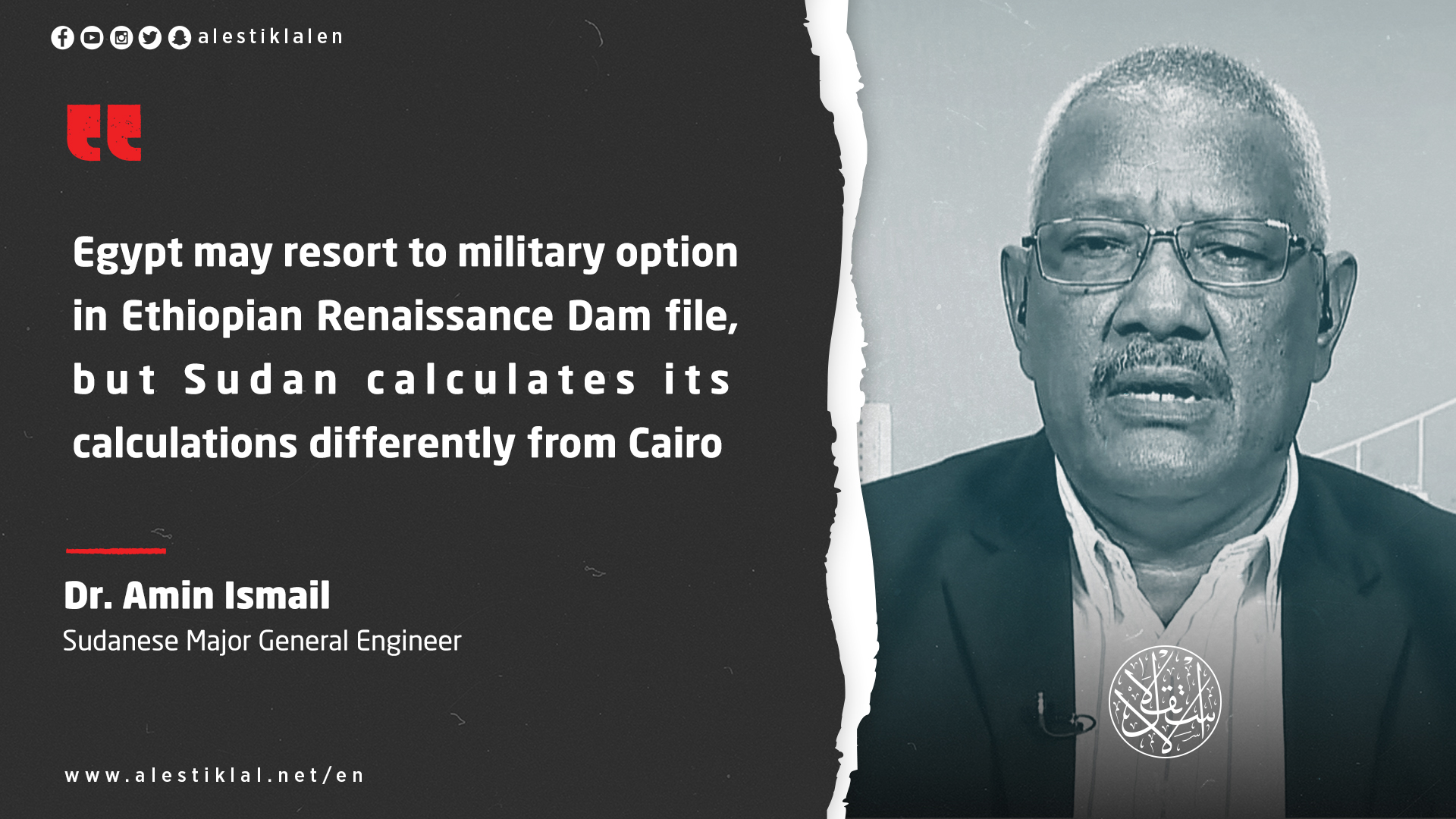
Borders and Renaissance Dam
- What is your assessment of the Sudanese position on the GERD crisis negotiations?
Dr. Amin Ismail: It is clear that there is Ethiopian intransigence and prevarication with a view to gaining time for not complying with the binding agreement to begin filling, jointly operating the dam and exchanging information.
The Sudanese strategy tended to act as a mediator, playing the role of water diplomacy at one point, but this also did not work and four-way mediation was proposed from Sudan, but Ethiopia also did not respond.
Now the matter has been submitted to the Security Council by the Sudanese Ministry of Foreign Affairs and therefore internationalized, as well as the failure of regional initiatives and the African Union to reach any agreement with Ethiopia, which represents the headquarters state of that Union, and now Egypt is living in the same vortex.
Or accept reality, live the order and hedge the second filling that has already begun, or finally resort to violent options, including military action, which requires political, economic and military equipment on the ground, an option that is not favorable to regional and international parties.
- What is the future of Egyptian-Sudanese relations in light of the Renaissance dam crisis?
Dr. Amin Ismail: These are long-standing and deep-rooted relationships that brought the people of the Nile Valley together before the construction of the Renaissance Dam, but now the options that result from the dam file may be paid for individual options for each country.
I specifically mean the military option that Egypt may resort to, but Sudan calculates its calculations differently from Cairo in military action, and this will also not be a major disagreement in the relationship between the two countries, but they need coordination, cooperation and understanding.
- What are the latest developments in the border dispute between Khartoum and Addis Ababa?
Dr. Amin Ismail: The dispute between Sudan and Ethiopia in what is known as the Fashqa land file is a dispute over border marking under the 1902 Convention and the demarcation of the border in 1903 between The Emperor of Ethiopia, Menlik II, with the English occupation government in Khartoum.
In 1972, Ethiopia also recruited farmers to exploit the land for rent, so that they could grow and harvest and then return home.
But in 1995, after an assassination attempt on (former Egyptian regime president) Hosni Mubarak, Ethiopia took advantage of the situation, introduced large groups into Sudanese territory and established its own armed militias and claimed to be out of control.
Now negotiations have reached an impasse between the two countries, with Ethiopia claiming to be dependent on these territories, prompting Sudan to redeploy its forces and regain 97 percent of the looted territory, with some rugged areas.
Ethiopia today has many internal problems and cannot engage the Sudan in war because of these territories because it serves only the ethnicity of the amass and not the Ethiopian people, but the Sudan is ready for the option of war if Addis Ababa wants.
However, Ethiopia is a locked state dependent on Sudanese ports for its exports and imports, and Sudan has 4 million Ethiopian workers who transfer about $200 million per month to Addis Ababa.
Sudan has so far received 82,000 refugees from Tigray, as well as its neutral position so far in the territorial conflict, all of which are well known to Ethiopia and cannot go to war with us.
The only solution is to bow to labelling again and to enter into an integrated economic partnership with Khartoum that is better for both of them, but occupying the territories and trying to rob them by force is unacceptable and Sudan will not accept it.
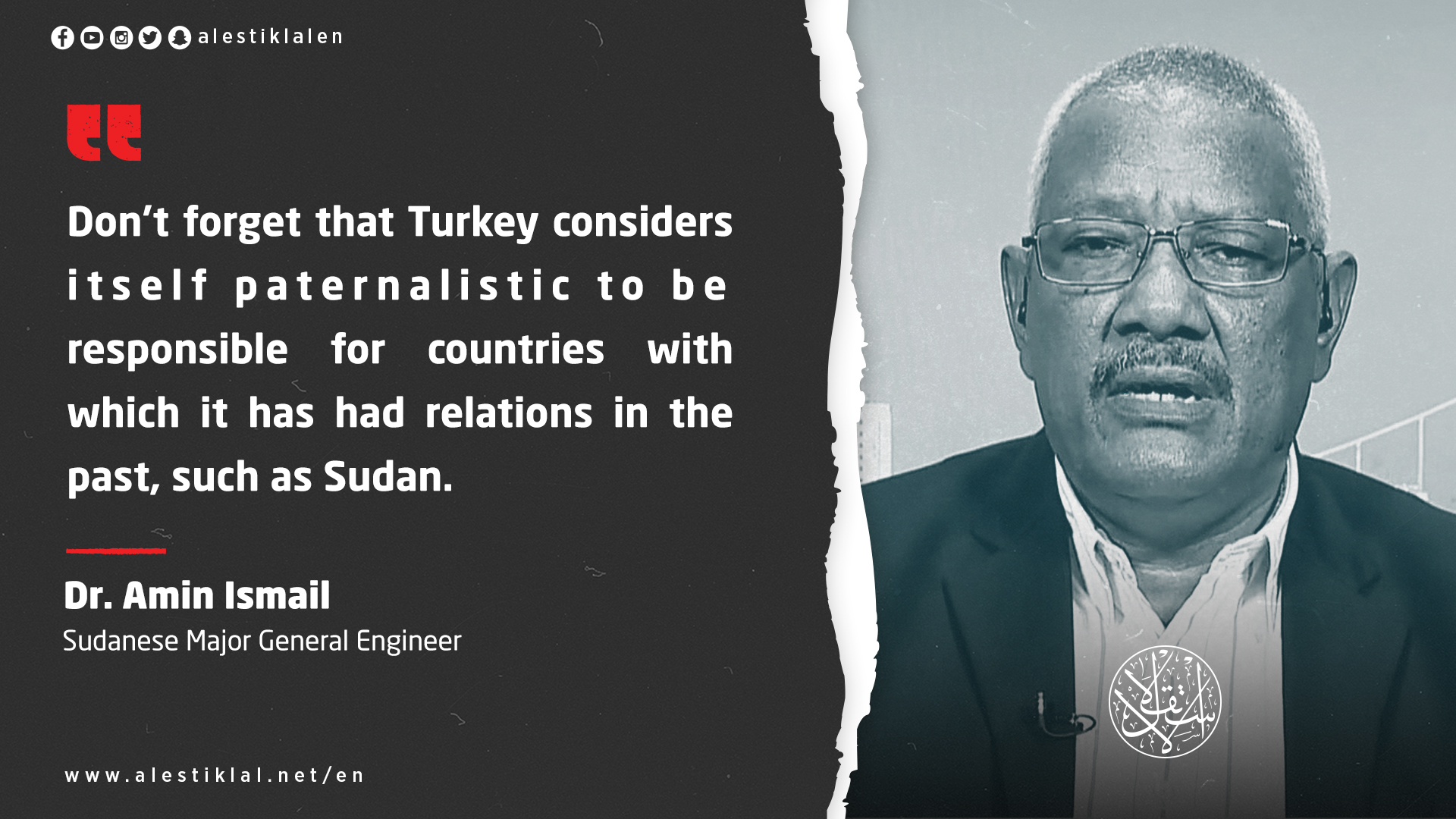
Relationships and Conflicts
- What is your assessment of the nature of Sudanese-Turkish relations and what is their future?
Dr. Amin Ismail: Sudanese-Turkish relations are exemplary, based on trade cooperation as well as historical relations, and let us not forget that Turkey once colonized Sudan before the English occupation.
Sudanese-Turkish relations were continuing and good under the previous regime, considering the ideological orientations that were shared between the two countries.
When the barricades revolution took place, Turkey received many symbols of the former regime, plunging relations into a slightly dark tunnel, but subsequent visits to Turkey by some Sovereignty Council officials removed this cloud in relations between the two countries.
Turkey has also issued directives to residents of its territory generally with Islamist tendencies in general to prevent them from political action or to direct abuses at various countries, including Sudan.
Turkey is now investing within Sudan in the areas of electric power, agriculture and others, and has a desire to enter into large and diverse investment areas.
I think that soon there will be visits at great levels between the two countries, and let us not forget that Turkey considers itself in parental terms to be responsible for countries with which it has had relations in the past such as Sudan.
- How do you explain sudanese Foreign Minister Maryam Sadiq al-Mahdi's visit to the Kremlin (July 2021)?
Dr. Amin Ismail: It is a visit that explores the Russian position that surprised everyone in the Security Council standing by Ethiopia away from Sudan and Egypt, and foreign minister Maryam Sadiq al-Mahdi reviewed the agreements signed with the former regime, first and foremost the naval base agreement or what is known as the logistics center.
But Russia is not trying to get into this file, because the United States is interested in it, and I mean here the GERD file.
The visit as a whole has not come up with anything new, and it is clear that Moscow sees taking the files as one package and these files against the other and all of them are taken as one package.
In my estimation, the visit was coordinated with other aspects, where the Minister visited New York ahead of the Security Council meeting, and before that a visit to Arab and African states to explain Sudan's position on the GERD file specifically.
- Where did the conflict within the Sudanese military on the one hand and the Rapid Support Forces come from?
Dr. Amin Ismail: In fact, there is no conflict between the armed forces and the Rapid Support Forces, allegations from some quarters also contained in the Prime Minister's initiative and were quickly answered through a rally in the General Command attended by the Commander-in-Chief, the President of the Council of Sovereignty and the Commander of Rapid Support, and no conflict was denied.
But the whole problem is how to integrate armed movements in accordance with the Juba peace agreement, where the Rapid Support Forces refuse to integrate as they were formed under a law under the former regime.
There are no problems, and the forces operate under the command of the Commander-in-Chief, although they are almost completely separate from their administrative, operational and intelligence components.
Al-Bashir and the Islamists
- Al-Bashir's trial before the International Criminal Court. Where did you get to?
Dr. Amin Ismail: The extradition of former President Omar al-Bashir and the rest of the wanted is controversial, as there are some military components in power that see the need to prosecute them inside Sudan, and another view that they should be handed over to the international criminal community.
The Criminal Court has three options, either to bring it before a national judiciary, or a hybrid court between the national and the international judiciary of the Criminal Court.
Or transfer him to The Hague to be tried by the International Criminal Court itself, this is a controversial case.
Some civilian authorities publicly state that they have been agreed to hand over to the international criminal; however, there are military components within the authority that refuse to hand them over and emphasize the need to prosecute them inside the Sudan, and this case will take longer unless there is regional and international pressure to speed up the trial.
- What is the future of the Islamic movement in Sudan in general, and the Kizan movement, especially under the current regime?
Dr. Amin Ismail: When the revolution took place, there was an agreement in the constitutional document to prevent members of the former ruling party, the National Congress, and all those who belonged to it from politics, during the transitional period.
The measures of the Committee against Empowerment and The Recovery of Looted Funds, which arrested a number of symbols of the former regime, have now been carried out.
They are also being prosecuted in the case of the coup d'état 89 of the former regime, the killing of the martyrs of the Ramadan movement in 1990, corruption cases involving the former First Deputy and many other cases.
They are therefore prohibited from working under the banner of the National Convention and are being prosecuted, and some plots of land and houses have been confiscated under proven corruption cases.
There is no prevention to the Islamic movement as an Islamic awareness advocacy movement; but practicing politics under the umbrella of the national congress is what I mean by prevention and persecution during the transitional period.



